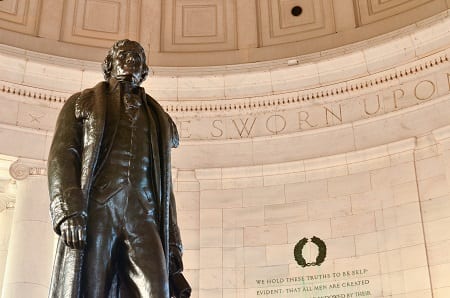 As in years past, the White House is expected to proclaim January 16 as Freedom of Religion Day. The day is the anniversary of the passage, in 1786, of the Virginia Statute of Religious Freedom. Regardless of what is said, most Christians believe there has been an erosion of their rights for some time. One of the biggest threats has been Obamacare, which threatened to violate the rights of at least two family-owned businesses, Hobby Lobby and Conestoga Wood Specialties. The Alliance Defending Freedom saw the threat and successfully defended the case at the Supreme Court for the two businesses. The case is now history, but the threats to our freedoms continue.
As in years past, the White House is expected to proclaim January 16 as Freedom of Religion Day. The day is the anniversary of the passage, in 1786, of the Virginia Statute of Religious Freedom. Regardless of what is said, most Christians believe there has been an erosion of their rights for some time. One of the biggest threats has been Obamacare, which threatened to violate the rights of at least two family-owned businesses, Hobby Lobby and Conestoga Wood Specialties. The Alliance Defending Freedom saw the threat and successfully defended the case at the Supreme Court for the two businesses. The case is now history, but the threats to our freedoms continue.
Religious Freedom Day
One is unlikely to hear from the mainstream media about Religious Freedom Day or the declaration of it. Christians have a wonderful opportunity to enlighten fellow citizens concerning our rights. The site www.religiousfreedomday.com has some information that is helpful in expressing the historical significance of the quest for liberty, and in particular, freedom of worship. There are materials that can be shared with school boards and principals, these can help make the public school a freedom friendly zone, not just for the newer religions, but for Christianity as well. The site also provides a list of rights for students and teachers in the public schools, which is an invaluable tool for knowing what can (and cannot) be done in the public school setting.
Our rights
From the school setting to the active defense of our first Amendment rights, there is much to do. There is a full-fledged attack on religious freedoms that may well have the religious freedoms of Christians in particular in its sights. A fire chief in Atlanta, Georgia was fired simply for stating his convictions concerning homosexuality in a document written for his church’s men’s Bible study group. He offered the document to his staff members, and it ended up causing him to be suspended. This happened in spite of the lack of evidence for any mistreatment of gays or lesbians that may have been on the employee roll. Tony Perkins, president of the Family Research Council, said of the incident: “The naked truth is that the actions taken against the chief are designed to send a message that will silence Christians and in effect force them to check their faith at the door of public service.”
While the fire chief may have been both tactless and thoughtless in presenting his church document to the fellow workers, limiting the freedom of speech by removing a person from office is an indirect attack on the freedom of religion that should not be left unquestioned.
Views of the founding fathers
The Founding Fathers for the most part were more concerned about one religious group removing the rights of other groups, than the prospect of a tiny minority of atheists attacking the rights of all people of faith. This is one of the reasons the First Amendment prevents the establishment of a state religion. They were firmly convinced, however, that the rights of religion and conscience should be honored. Even Thomas Jefferson and Thomas Paine, who disagreed with some tenants of Christianity, supported a right to conscience in these matters:
“I consider the government of the United States as interdicted by the Constitution from intermeddling with religious institutions, their doctrines, discipline, or exercises. This results not only from the provision that no law shall be made respecting the establishment or free exercise of religion, but from that also which reserves to the States the powers not delegated to the United States. Certainly, no power to prescribe any religious exercise or to assume authority in any religious discipline has been delegated to the General (Federal) Government…” wrote Thomas Jefferson.
Thomas Paine, with brevity, concurred: “The Reformation was preceded by the discovery of America, as if the Almighty graciously meant to open a sanctuary to the persecuted in future years, when home should afford neither friendship nor safety.”
A modern day defender of our rights, though a self-described skeptic, is hopeful that people will understand the Federal State’s tendency to require worship and exclusive allegiance is something to be fought. Perry Willis, co-founder of Downsize DC and the Zero Aggression Project, has written an essay for the benefit of both believers and skeptics. Government should be limited to defending the rights of individuals, and should neither coerce one to practice a faith, nor restrict one’s right to practice a faith. This is the principle on which the First Amendment rights to practice one’s faith rests, and should apply equally to all.
Penni Bulten is a homeschooling mom who is fascinated with the Founding Fathers and their faith. She can be reached at [email protected].

Comments